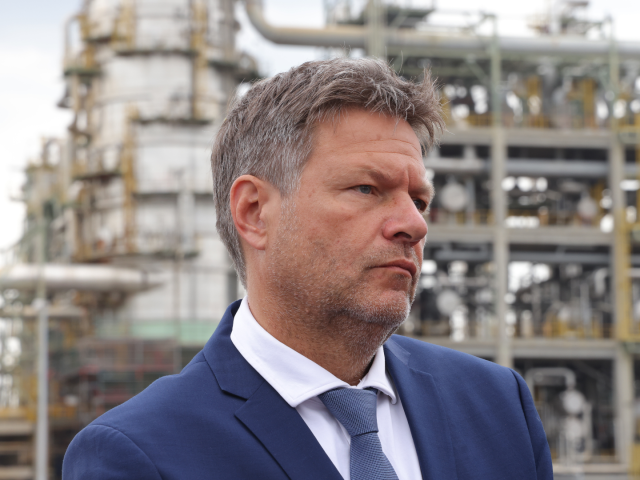Germany is facing a “Lehman Brothers” collapse in its energy market that could spark a domino effect leading to a severe recession should the gas-addicted economic powerhouse of the European Union be fully cut off from Russian energy supplies.
Economy Minister and Vice-Chancellor Robert Habeck said on Friday that Europe’s largest economy could be forced to shut down certain industries should gas supplies run thin by the winter.
“Companies would have to stop production, lay off their workers, supply chains would collapse, people would go into debt to pay their heating bills, that people would become poorer,” he said according to DW.
The Green Party politician warned that there could be “a kind of Lehman-Brothers effect in the energy market,” spreading through municipal utilities, industrial and commercial companies, “And then you have a domino effect that would lead to a severe recession.”
Habeck was referring to the now defunct financial services firm Lehman Brothers, whose bankruptcy marked a pivotal moment in the Global Financial Crisis of 2008. The impact of Lehman’s collapse was particularly widespread due to the interconnectedness of its balance sheets with other banks, insurance companies, hedge funds, and other financial institutions. Many believe that the U.S. government made a critical mistake in allowing Lehman to fail and that the failure worsened the crisis and subsequent economic calamity. Others, however, have said that not rescuing Lehman was necessary and actually improved the financial system and prevented a worse economic outcome.
Germany has moved one step closer to rationing gas after the country triggered its second bout of emergency powers over the ongoing crisis. https://t.co/dukZwhQ5LR
— Breitbart News (@BreitbartNews) June 24, 2022
Also on Friday, the head of the Federal Network Agency (Bundesnetzagentur) energy regulator, Klaus Müller said called on the German population to reduce their energy consumption in order to lessen the impact of a possible Russian cut off, after natural gas travelling from Russia to Germany via the Nord Stream One pipeline was already reduced to 40 per cent.
“Everyone in industry and in their home life can contribute to this — and yes, this also includes jumpers, shower heads, turning the heating down a bit, all of this helps,” he said, adding that consumers are set for a two or threefold increase in their gas bills in the coming months.
Müller predicted on Thursday that the country could only live off reserves for less than three months without Russian gas over the Winter, saying: “If the storage facilities in Germany were mathematically 100% full… we could do without Russian gas completely… for just about two-and-a-half months and then the storage tanks will be empty.”
The dire situation for Europe’s largest economy comes after persistent warnings from figures such as former President Donald Trump, whose warnings of over reliance on Russian energy were left unheeded. The predicament could also be seen as an indictment on the country’s attempt to “go green” over the past decade, in particular that Germany has now ramped up coal production to compensate for the supply cuts.
Despite calls from the likes of the International Energy Agency to not abandon nuclear power, the German government appears to be dead set on continuing the Merkel-era policy of phasing out all reactors by next year.
Germany is not alone, however, in returning to coal power in Europe, with both Austria and the Netherlands announcing that they will once again start buring coal en masse. Italy, which is also heavily dependent on Russian energy, is also expected to once again turn to their raging coal fire power plants to meet their energy demands.
Germany’s Finance Minister has called for the country to keep using nuclear power to ease the ongoing energy crisis, despite one energy tsar in the country labelling it “backwards.” https://t.co/NS93Fu8IyA
— Breitbart News (@BreitbartNews) June 23, 2022
Follow Kurt Zindulka on Twitter here @KurtZindulka

COMMENTS
Please let us know if you're having issues with commenting.